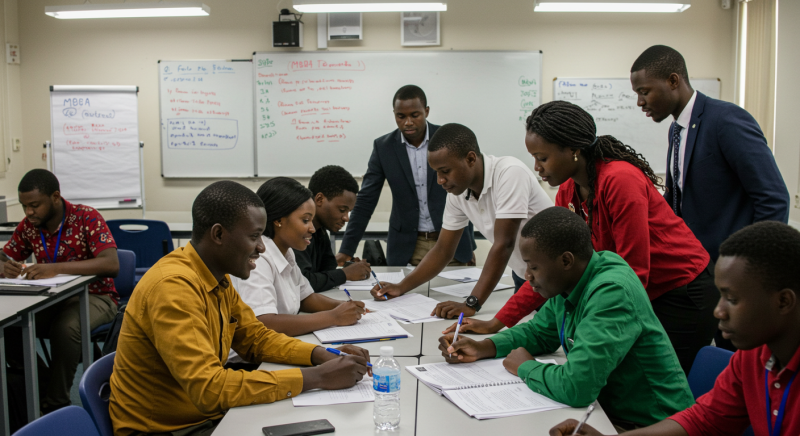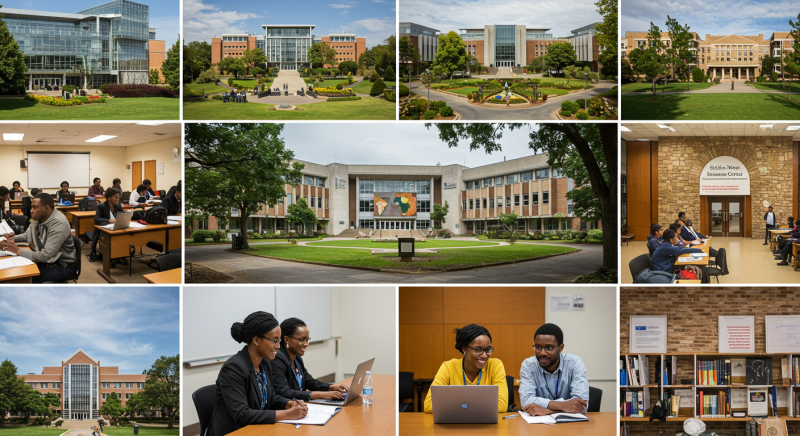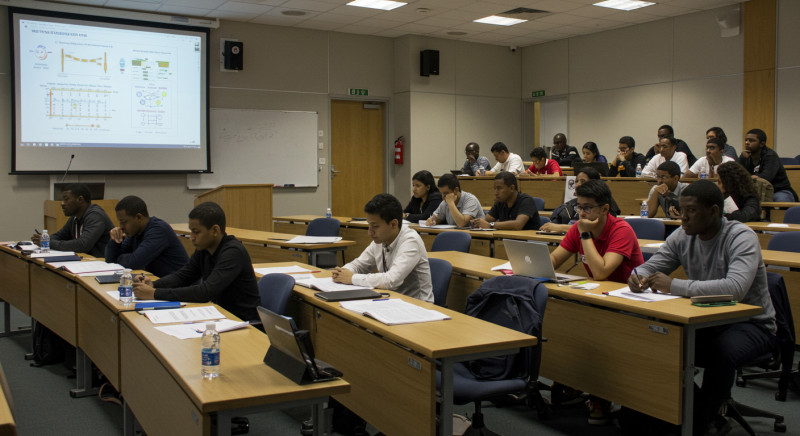The Journey to Higher Education
The journey to obtaining an MBA as an African student often begins with excitement and ambition but quickly faces the hurdle of financing. I remember meeting Adeola, a brilliant economics graduate from Lagos, who dreamed of attending a top business school but nearly abandoned her aspirations when she saw the tuition costs. “How can someone from my background ever afford this?” she questioned. Two years later, Adeola graduated from London Business School with a fully-funded MBA, transforming her career and creating opportunities she never imagined possible.
This story resonates with thousands of African students who have the talent and drive but lack the financial resources to pursue an MBA. The good news is that numerous MBA scholarships for African students exist across the globe, designed specifically to bridge this gap and cultivate business leadership from the continent.
Key Takeaways
The landscape of MBA scholarships for African students has expanded dramatically in recent years, with institutions recognizing the value of African perspectives in global business education. Funding options range from full-ride scholarships at prestigious universities to partial tuition waivers and stipends provided by foundations and corporate sponsors. Many African students successfully fund their MBA education through a combination of scholarships, grants, and financial aid packages tailored to their backgrounds and career aspirations. Application success requires strategic planning, typically beginning 12-18 months before intended enrollment, with emphasis on demonstrating leadership potential and commitment to Africa’s development. The return on investment for African MBA graduates includes not only personal career advancement but also positively impacting economic growth across the continent.

MBA Scholarships for African Students in the United States
The United States hosts many of the world’s top business schools, and fortunately, numerous scholarship opportunities exist specifically for African students seeking MBA education in America.
Fulbright Foreign Student Program
The Fulbright Program offers comprehensive funding for graduate students from sub-Saharan African countries. These scholarships cover tuition, textbooks, airfare, health insurance, and living stipends. The program seeks individuals who demonstrate academic excellence and leadership potential, with a commitment to returning to their home countries to contribute to development efforts. According to the Institute of International Education, approximately 4,000 foreign students receive Fulbright scholarships annually, with a significant portion allocated to African applicants [https://foreign.fulbrightonline.org/].
Stanford Africa MBA Fellowship
Stanford Graduate School of Business offers the Africa MBA Fellowship, covering the full cost of tuition and associated fees (approximately $160,000) for African students. This prestigious fellowship aims to build a pipeline of future leaders who are committed to making an impact on the continent’s development. The program admits 8-10 African students annually, with recipients committing to working in Africa for at least two years within four years of graduation [https://www.gsb.stanford.edu/programs/mba/financial-aid/fellowships/stanford-africa-mba-fellowship].
Harvard Business School Forward Fellowship
Harvard Business School’s Forward Fellowship provides significant financial support to students from lower-income backgrounds, including many African applicants. The fellowship can provide up to $80,000 over the two-year MBA program. Selection criteria focus on socioeconomic factors and demonstrated financial need, making this an excellent option for African students with limited resources [https://www.hbs.edu/mba/financial-aid/forward-fellowship/].
MBA Scholarships for African Students in Europe
European business schools have increasingly recognized the importance of African representation and offer various scholarship programs targeting students from the continent.
London Business School MasterCard Foundation Scholarship
This partnership between London Business School and the MasterCard Foundation provides comprehensive scholarships for African students, covering full tuition, living expenses, travel costs, and professional development opportunities. The program specifically targets students from economically disadvantaged backgrounds who demonstrate academic excellence and leadership potential. According to the MasterCard Foundation, they have committed over $800 million to educate young people from Africa [https://www.mastercardfdnscholars.org/].
ESMT Berlin African Excellence Scholarships
The European School of Management and Technology (ESMT) in Berlin offers full and partial tuition scholarships specifically for outstanding African applicants. These MBA scholarships for African students cover between 50% and 100% of the tuition fees. ESMT particularly values candidates with professional experience in Africa and those planning to contribute to the continent’s economic development after graduation.
INSEAD Diversity Scholarships
INSEAD, with campuses in France and Singapore, offers several diversity scholarships that African students can apply for, including the Nelson Mandela Scholarship and the Africa Leadership Fund. These scholarships typically range from €10,000 to full tuition coverage, with selection based on academic excellence, professional achievements, and leadership potential. INSEAD has increased its commitment to African student representation, with approximately 10% of its MBA cohort now coming from the continent.

MBA Scholarships for African Students Within Africa
The landscape of business education in Africa has evolved significantly, with several world-class business schools now offering competitive MBA programs with scholarship opportunities.
African Leadership University School of Business (ALUSB)
Based in Rwanda, ALUSB offers the V-MBA program with various scholarship options covering up to 75% of tuition costs. The school focuses on developing ethical business leaders who can drive Africa’s transformation. Their unique leadership development curriculum has attracted significant funding from global investors, allowing them to provide substantial financial support to deserving candidates from across the continent.
University of Cape Town Graduate School of Business
The UCT Graduate School of Business offers several scholarships for its MBA program, including the Klaus-Jürgen Bathe Leadership Scholarships, which cover full tuition and living expenses. These MBA scholarships for African students target individuals with exceptional academic records and demonstrated leadership potential. The school’s strong corporate connections also facilitate numerous corporate-sponsored scholarships for students from various African countries.
Lagos Business School (Pan-Atlantic University)
Lagos Business School offers merit-based scholarships covering up to 50% of MBA tuition fees for outstanding applicants. Additionally, their corporate partnership program enables sponsorships from major Nigerian and multinational companies operating in West Africa. The school’s alumni network is one of the strongest in Africa, providing additional mentorship and financial support opportunities for current students.
Corporate and Foundation MBA Scholarships for African Students
Beyond academic institutions, numerous corporate entities and foundations provide MBA funding specifically targeting African talent.
The Mo Ibrahim Foundation Scholarship
The Mo Ibrahim Foundation, established by Sudanese-British billionaire Mo Ibrahim, offers fully-funded MBA scholarships for African students at several partner institutions, including London School of Economics and SOAS University of London. The foundation focuses on governance and leadership development in Africa, with scholarship recipients expected to return to Africa to contribute to the continent’s progress.
Chevening Scholarships
Funded by the UK Foreign, Commonwealth and Development Office, Chevening Scholarships provide full financial support for African students pursuing master’s degrees, including MBAs, at UK universities. These prestigious scholarships cover tuition fees, living expenses, and travel costs. According to Chevening statistics, over 700 scholars from Africa are selected annually across various disciplines [https://www.chevening.org/].
The Africa-America Institute (AAI)
The AAI administers several scholarship programs for African students, including MBA opportunities. Their initiatives have supported over 16,000 African students in pursuing higher education. The organization has a particular focus on developing business leaders who will contribute to Africa’s economic transformation and strengthen Africa-America relations.
How to Successfully Apply for MBA Scholarships as an African Student
Securing MBA scholarships for African students requires strategic planning and preparation.
Start Early and Research Thoroughly
Begin your scholarship search at least 12-18 months before your intended start date. Create a comprehensive spreadsheet tracking application requirements, deadlines, and necessary documents for each opportunity. Utilize resources like scholarship databases, university financial aid offices, and professional networks to identify opportunities that match your profile.
Craft a Compelling Personal Story
Scholarship committees are looking for more than academic excellence—they want to invest in transformative leaders. Develop a narrative that connects your past experiences, MBA aspirations, and future goals in Africa. Highlight specific challenges you’ve overcome and how these experiences have shaped your determination to succeed. Many successful scholarship recipients emphasize their commitment to addressing specific issues in their home countries after completing their MBA.
Prepare for Standardized Tests
Most prestigious MBA scholarships require competitive GMAT or GRE scores. The average GMAT score for scholarship recipients at top business schools typically exceeds 700. Dedicate sufficient time for preparation, potentially 3-6 months of consistent study. Consider professional test preparation resources if affordable, or utilize free online resources like GMAT Club and official practice tests.
Seek Strong Recommendation Letters
Identify recommenders who can speak specifically to your leadership potential, academic abilities, and character. Brief them thoroughly about the scholarships you’re applying for and the specific qualities each program values. Professional recommendations from supervisors who can describe your impact and potential often carry significant weight in scholarship decisions.
Demonstrate Community Impact
MBA scholarships for African students often prioritize candidates who have demonstrated commitment to community development. Document your volunteer experiences, community initiatives, or professional projects that have created positive change. Quantify your impact whenever possible and articulate how an MBA will enhance your ability to create larger-scale change in the future.
Success Stories: African MBA Scholarship Recipients
The impact of MBA scholarships for African students extends beyond individual careers to influence entire communities and industries across the continent.
From Rural Nigeria to Global Consulting
Oluwaseun Adebayo grew up in rural Nigeria with limited access to quality education. After completing his undergraduate studies through local scholarships, he secured the Stanford Africa MBA Fellowship. Post-MBA, he joined McKinsey’s Lagos office, where he now leads projects on financial inclusion across West Africa. His work has helped extend banking services to over 2 million previously unbanked individuals.
Building Tech Ecosystems in East Africa
Kenyan entrepreneur Wanjiku Kimani received a full scholarship to pursue her MBA at INSEAD through their Diversity Scholarship program. Using the knowledge and network gained during her MBA, she returned to Nairobi and founded a technology incubator that has supported over 50 startups and created approximately 300 jobs in East Africa’s growing tech ecosystem.
Transforming Agricultural Practices
Jean-Pierre Munyanziza from Rwanda received the MasterCard Foundation Scholarship to study at London Business School. After his MBA, he established an agricultural technology company that works with over 10,000 small-scale farmers to improve crop yields through data-driven farming techniques. His business has increased average farmer incomes by 40% while promoting sustainable practices.
Challenges and Considerations
While MBA scholarships for African students provide tremendous opportunities, applicants should be aware of several challenges and considerations.
Competitive Selection Processes
The most prestigious MBA scholarships for African students are extremely competitive, with acceptance rates often below 5%. Applicants should apply to multiple scholarship opportunities and consider alternative funding sources as backup plans. Developing a unique personal narrative that distinguishes you from other qualified candidates is essential for standing out in these competitive pools.
Visa and Immigration Requirements
Securing scholarships is only part of the journey; international students must also navigate visa processes. Some scholarships don’t cover expenses related to visa applications, which can be substantial. Additionally, certain scholarships may have specific visa requirements or restrictions that applicants should thoroughly understand before accepting offers.
Return Obligations
Many MBA scholarships for African students include requirements to return to Africa for a specified period after graduation. While this aligns with many students’ intentions to contribute to the continent’s development, it’s important to understand these obligations fully before committing. Some programs have financial penalties for failing to fulfill these requirements.
Cultural Adjustment and Support Systems
Studying abroad presents cultural adjustment challenges that can impact academic performance. Prospective students should research the support systems available at their target institutions, including African student associations, cultural centers, and mentorship programs. These resources can significantly improve both the educational experience and scholarship outcomes.
Future Trends in MBA Scholarships for African Students
The landscape of MBA scholarships for African students continues to evolve in response to changing economic conditions and educational priorities.
Increased Focus on Female African Business Leaders
Many scholarship programs are now allocating specific funding to support African women in business education. The Forté Foundation, for example, has partnered with several top business schools to provide fellowships specifically for female MBA candidates, including those from Africa. This trend reflects recognition of the vital role women play in Africa’s economic development and the historical underrepresentation of women in business leadership positions.
Remote and Hybrid MBA Options
The pandemic accelerated the development of high-quality online and hybrid MBA programs, many of which now offer scholarships for African students. These flexible formats allow students to remain in their home countries while accessing international business education, often at reduced costs compared to traditional programs.
Industry-Specific Scholarships
There’s a growing trend toward MBA scholarships targeting African students interested in specific industries crucial to the continent’s development, such as renewable energy, healthcare management, agricultural business, and financial technology. These specialized scholarships often include internship or employment opportunities with sponsor companies, creating direct pathways to impactful careers.

Conclusion
MBA scholarships for African students represent more than financial assistance—they are investments in the continent’s future business leadership. As we’ve explored throughout this guide, opportunities exist across global regions, from prestigious American institutions to European business schools and Africa’s own emerging centers of business education excellence.
For ambitious African students with limited financial resources, these scholarships open doors that might otherwise remain closed, allowing talent to flourish regardless of economic background. The strategic approach to application—starting early, crafting compelling narratives, and demonstrating commitment to Africa’s development—significantly increases chances of success.
The impact extends far beyond individual careers, as evidenced by the success stories of scholarship recipients who have returned to create businesses, generate employment, and address critical challenges across the continent. By providing access to world-class business education, MBA scholarships for African students are helping to build the next generation of leaders who will drive sustainable economic growth and innovation throughout Africa.
For those beginning this journey, remember Adeola’s transformation from doubt to success. With determination, strategic planning, and the right information, you too can access these opportunities to fund your MBA education and subsequently contribute to Africa’s promising future.
Frequently Asked Questions
What GPA do I need to qualify for MBA scholarships for African students?
Most competitive MBA scholarships require a minimum undergraduate GPA of 3.0 (or equivalent in other grading systems), though successful applicants to top programs typically have GPAs of 3.5 or higher. However, scholarship committees often take into account the reputation of your undergraduate institution and the rigor of your course of study, sometimes making allowances for students from educational systems with different grading standards.
Can I apply for multiple MBA scholarships simultaneously?
Yes, you should apply for multiple MBA scholarships for African students simultaneously to maximize your chances of securing funding. There are no restrictions on applying to different scholarship programs, even those at different institutions. Just ensure you can manage the different application requirements and deadlines effectively.
Are there MBA scholarships specifically for African women?
Yes, several programs specifically target African women pursuing MBA degrees, including the Forté Fellows Program, Goldman Sachs 10,000 Women initiative, and specific allocations within broader scholarship programs like the Chevening Scholarships. These initiatives aim to address the gender gap in business leadership across Africa.
Do I need work experience to qualify for MBA scholarships?
Most competitive MBA scholarships for African students require at least 2-3 years of professional work experience. Scholarship committees typically value quality over quantity, looking for candidates who can demonstrate leadership, impact, and career progression rather than just years of service.
What happens if I receive a scholarship but cannot attend that specific program?
Scholarship policies vary widely regarding deferrals or transfers. Some programs may allow you to defer your scholarship for one year due to extenuating circumstances, while others have strict usage policies. Generally, scholarships cannot be transferred between institutions. Always review the terms and conditions carefully and communicate proactively with scholarship administrators if your circumstances change.
READ MORE
